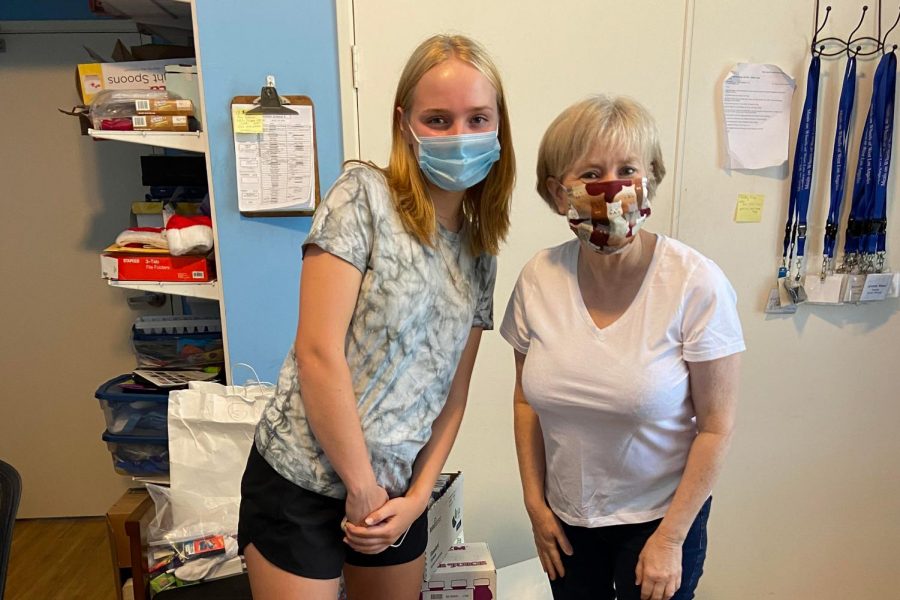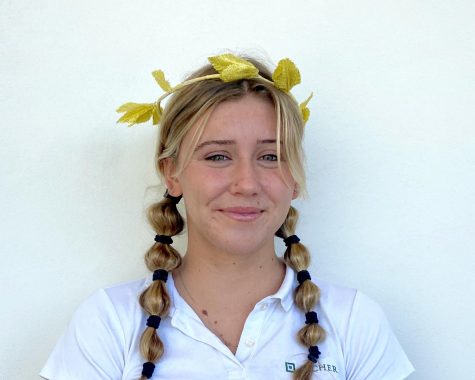Students adapt service learning projects amid pandemic
Photo credit: Lauren Robson
Lauren Robson with a leader from the Meals on Wheels organization who helped Robson launch her senior outreach program. Robson’s outreach projects is one of the unique service opportunities that COVID-19 has created.
September 25, 2020
Schools have moved to remote spaces, sports practices are socially distanced and previously normal interactions with friends are no longer common. Due to this new environment, Archer students involved in service learning projects, which often involves in-person interactions, have been made to adapt. While students have been able to continue their projects, new branches and areas of service have grown from COVID-19 challenges.
The ninth grade social science course ”Understanding the Contemporary World”, introduces introduces Archer’s service learning curriculum and service learning projects, which students can continue until their senior year and beyond. Students’ service learning projects require volunteer hours as well as in-person service work, something that has been challenged by Los Angeles County’s COVID-19 restrictions.
After they propose their service learning project ideas in freshmen year, students may chose to enact their project from which they can apply and be awarded a bronze, silver or gold award. Students can work with pre-existing organizations such as Meals on Wheels, Wags and Walks or Tree people, or they can create their own organization or method of service. Junior Lauren Robson created her own program called Tú and Me, which connects volunteers with children from Baja, Mexico over phone calls to work on their conversational English.
“I’m calling three different students in Baja Mexico, and I’ve really gone deep in my relationship and work with the students,” Robson said. “I think, for me, it’s definitely allowed me to become a trusted source of support for the students during this time of chaos and uncertainty.”
Other programs like Camp Harmony, which senior Olivia Rosen works with, typically function as in-person volunteer work. Underprivileged children come to Camp Harmony for a week-long summer camp and a President’s Day weekend camp “to emphasize the beauty of nature, and to offer activities in art, sports, personal health,” something that COVID-19 restrictions prevented from happening in the normal setup.
“We had like a virtual weeklong camp, it was like a huge Zoom. In the afternoons we did song sessions, yoga and Jeopardy. I don’t know how [the camp] did it, but it was great,” Rosen said. “The time to like connect, it was a little weird, but it was so great to see the kids faces, it was really sweet.”
History teacher Margaret Shirk, who developed the service learning projects curriculum and heads the Community Service Leadership Board, was “blown away” by the opportunities to continue service remotely. Shirk also notes that the social climate has also created additional service opportunities.
“With an equity in education, and not everybody has access to one to one laptops that are sure, and not everyone has the same resources in their schools. How can you tutor a student that needs assistance through using your technology?”
Sophomore Kennedy Schultz is training with Teen Line, “a teen-to-teen hotline with community outreach service,” where teens go through various training classes to become certified to make calls for the hotline. Shultz is currently still in training, which has been moved to a remote space, but she can assist in answering emails and notes that COVID-19 has changed the calls that Teen Line has been answering.
“Lots of people now call because they’re lonely, and a lot of child abuse calls and family relations because they’re all trapped in their house,” Shultz said. “So their mental health is plummeting, like if they’re in a bad family environment. We get lots of phone calls about that more often than anything else at the moment.”
Robson’ service learning project is centered around her organization Tú and Me, but she has taken up other service work with her free time created by the pandemic. Robson also tutors students in inner city schools and she is currently developing another service program to connect senior [citizens] isolated because of health risks.
“I was really moved by how lonely many of their homebound seniors were because of COVID. [They] are extremely scared to leave their homes. I actually started Students to Seniors, where I also make weekly calls to connect socially with the homebound seniors,” Robson said. “A simple phone call, whether it be to a struggling teen in an orphanage in Mexico or to an 80-year-old woman who rarely leaves her apartment, it’s just amazing how big of a difference that can make.”
Shirk does not plan on changing any of the requirements for service learning awards but will be making time to meet with students to assist in adjusting their service to work around COVID-19. The Archer Learning Hub page now also has a link for service and activism, and has an inventory for remote service opportunities available to all students.
“I think there’s a lot of issues that students are feeling really passionate about and want to make a difference,” Shirk said. “I think that if we think strategically we can come up with ways with the restrictions to be able to continue to make change.”









